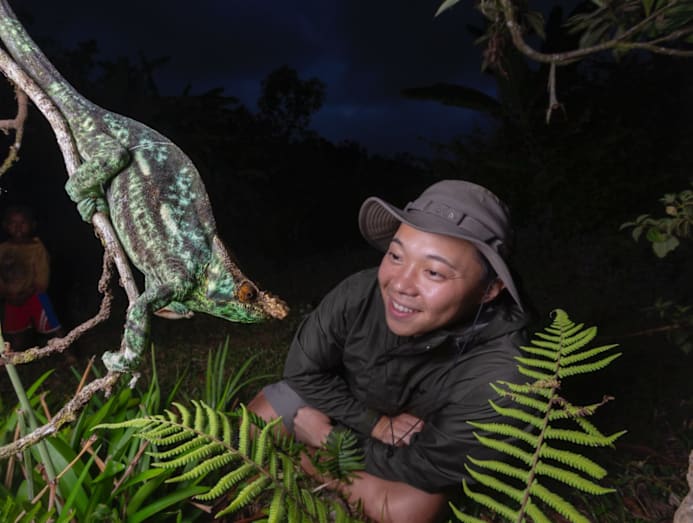'I can motivate people to take action' - how Singapore's young climate activists are leading by example
With climate fatigue and indifference on the rise, some young advocates hope to make sustainability less intimidating – and more human.

Zac Toh (left), founder of City Sprouts, and Kong Man Jing, founder of Just Keep Thinking, are co-organising Earthopia, Singapore’s first youth-driven sustainability festival. (Photo: CNA/Raj Nadarajan)

This audio is generated by an AI tool.
When Ms Kong Man Jing first stepped off the ferry onto St John’s Island as a junior college student in 2012, she expected little more than a three-day sun-soaked excursion.
Instead, her eyes were opened to a hidden world — coral reefs, skittering crabs, slithering octopuses, sea anemones, and dense forests alive with birdsong.
“I realised, for the first time, that Singapore had lots of beautiful wildlife,” recalled the 31-year-old.
"I was blown away, and I wondered why I didn't know any of this before."
That sense of wonder was the catalyst for Ms Kong to pursue a degree in environmental biology, and later, in 2019, to start Just Keep Thinking – a social media initiative where she shares accessible, bite-sized lessons on science and nature.
Today she has more than 500,000 followers on TikTok and Instagram combined. She is often also known to many as "Biogirl MJ", the bespectacled science teacher with an infectious personality.
In fact, she even met an 11-year-old girl who started a nature club in her own primary school after going on a nature walk organised by Ms Kong in 2021.
"She said she really wanted to get her friends involved. That was the turning point for me – I realised our work has a lot more meaning than I thought," she said.
"I wasn't just giving away knowledge. I can motivate people to take action as well."
I realised ... I wasn't just giving away knowledge. I can motivate people to take action as well.
Ms Kong is part of a group of young adults at the forefront of environmental activism in Singapore, where attitudes towards climate change vary drastically from the impassioned to the indifferent.
As a low-lying island nation in one of the world's most climate-vulnerable regions, Singapore faces threats ranging from rising seas to intensifying heat and heavier monsoons.
Yet, a 2023 survey by the Iseas-Yusof Ishak Institute showed that just 43.7 per cent of Singaporeans believe climate change "is a serious and immediate threat" to the well-being of the country.
This figure has dropped substantially from 66.4 per cent in the 2021 edition of the report.
But despite this, a number of young people like Ms Kong are still finding creative ways to engage their peers on the issues of climate change and sustainability.
One of them is Mr Zac Toh, the 33-year-old co-founder of urban farming social enterprise City Sprouts, who is working with Ms Kong to organise Singapore's first ground-up environmental festival called Earthopia.
CNA TODAY spoke to Ms Kong, Mr Toh and three other youth advocates to discover what lies behind their passion for the environment, and why they're choosing to focus more on inspiring others towards everyday change.
PASSION IN THEIR ROOTS
Mr Toh was surrounded by nature growing up. His family ran more than 120ha of plant nurseries across Southeast Asia – and while he initially wanted to pursue a career in consulting or banking, as he approached his 20s, he realised that his true calling was rooted in earth's soil.
"For me, it was really choosing something that I wanted to spend my lifetime doing – not thinking about whether I'm rich or poor," he said.
"My grandfather was a turf grower, and my dad grows trees, so from young I was always in nature. I realised I'm born to do this and that this is what I really like."
His venture began as a single project to transform the old Henderson Secondary School into a conducive space for urban farming. It went on to become City Sprouts' flagship farm, now hosting 38 greenhouses in the heart of Tiong Bahru tended to by local farmers.
Earlier this month, the City Sprouts team opened its new youth-led community and culture hub, City Sprouts @ Bedok, on the site of the former Kampong Chai Chee Community Club.
And over the years, the social entrepreneur has found much joy in knowing his spaces have been beneficial for new green-entrepreneurs.
City Sprouts helped businesses like local hydroponics farm Tomato Town and sustainable fashion startup Cloop with a space to grow in their initial stages, for instance.
But his urban farms also help Singaporeans young and old to cultivate an appreciation for nature and sustainability. That, in his view, is equally important when it comes to assessing the impact of his work.
"We had a lot of seniors that came to farm at Henderson, and you can see the joy in their faces when they show young people what they've grown," he said.
"One uncle who works for us probably has more hair now than he did five years ago, and he has become happier as a senior," he added – a light-hearted reference to how farming has boosted well-being for many participants.
That willingness to choose passion over convention is something Ms Zoee Lim, 23, recognised in herself. But while Mr Toh's calling came gradually, hers arrived as a gut punch.
When she discovered that around 3 billion animals were wiped out in the 2019-20 Australia bushfires, Ms Lim said she was "devastated".
"I dug into the reasons on why and how these fires were so out of control, and discovered a huge part of it could be attributed to climate change. I began looking at what I can do to help.”
In addition to her full-time job as a fauna specialist at a biodiversity consulting firm, Ms Lim channels her advocacy efforts into guided walks and social media content to raise awareness about nature.

Meeting people from all walks of life, from seasoned environmentalists to newbies eager to learn, has deepened Ms Lim's passion for protecting the planet and inspired her to do even more.
With those already in her community, her conversations often turn into an exchange of insights, tips and experiences. But seeing newcomers – especially those who were once indifferent – change their perspectives can be particularly heartwarming, she said.
"And whenever I meet such people, their drive always inspires me to try my best to do more, both for nature and for helping people bridge the gap between nature and them. It truly reminds me that in this fight for nature, I am not alone."
CHALLENGES AND CHANGE
But even the most passionate advocates admit the work can sometimes feel like a slog.
While interest in sustainability has grown, they still find themselves pushing against a backdrop of apathy, or a sense that climate change is too big for individuals to make a dent.
Mr Dennis Chan, 31, has seen this first-hand during the guided nature walks he leads via The Untamed Paths, an organisation he founded to connect people with local biodiversity.
"Sometimes it feels like not everyone sees the urgency, and they overlook just how important this is," he said.
Sometimes it feels like not everyone sees the urgency, and they overlook just how important this is.
Ms Lim, who often encounters scepticism as a young ecologist, said both younger and older people can tend to shift responsibility for taking action.
She recalled being told that people her age had "no right" to lecture others on how to live more sustainably.
"The older generation would often say that by the time disaster (from climate change) strikes, they would not be around anymore to see it happening. Therefore, it is not their concern," she said.
Some of her younger peers, on the other hand, view climate change as "a problem for older people to solve".
The topic of environmentalism also sometimes suffers from the impression that it is all about "serious" business, and that it can be too complex to understand.
A spokesperson from SG Climate Rally, a youth-led movement advocating for climate justice, said one of the challenges it faces is trying to simplify environmental issues and make them relatable to people.
"For example, with carbon tax and conservation issues, they can get a bit scientific," they said.
"If you're not too careful, your advocacy might be inaccessible to the layperson."
For those reasons, it can be difficult for sustainability initiatives to reach beyond those who already care about climate change, advocates told CNA TODAY.
Mr Toh of City Sprouts added: "When most people think of a sustainability event, the first thing that comes to mind is a serious speech or a panel discussion.
"But it’s not just for serious people. The everyday Joe needs to know about all these trade-offs that we face too."
GIVING SUSTAINABILITY A REBRAND
Against this backdrop of apathy and lack of interest, the primary question for a new generation of climate activists is no longer: "How do you educate and inform people?" Rather, it is: "How do you make people care?"
Ms Kong of Just Keep Thinking and Mr Toh have an answer to this: Break the stereotypes that are keeping us paralysed.
They're making a start with Earthopia, a festival slated to take place Oct 24 and 25 at Dhoby Ghaut Green.
The event will feature a total of 17 artistes performing on stage, visual arts performances, interactive art installations – all powered entirely by renewable energy.
Nothing will be disposable too. Every booth, from plastic upcycling to composting to educational content creation, will invite attendees to participate.
Doesn't sound like your typical forum-slash-conference on sustainability? That, said Ms Kong, is the entire point.
"We don't want sustainability to be scary or complicated. It can be fun and positive."
For the event organisers, these participatory activities are a crucial "first touchpoint", a way for people to realise that there are little ways to incorporate sustainability in their everyday lives.
"Sustainability isn't just a corporate thing," said Ms Kong. "There are many ways to contribute and we don't have to wait for the government to do something."
Other advocates also found that one of the most effective ways to encourage an individual to take action is to not to lecture but to involve them and evoke an emotion.
Mr Chan of The Untamed Paths said showing people why something matters works far better than simply telling them what to do.
He conducts intertidal walks, which are guided nature tours exploring the rich marine life of the intertidal zone – the area between the high and low tide marks.

"When someone curious explores the intertidal zone and observes a small flower crab – (a creature) we so often just associate with food – go about its day or learn how to reuse everyday materials creatively, people feel part of the (wider ecosystem)," he said.
"That feeling often drives longer-term changes in behaviour."
FINDING HOPE IN SMALL VICTORIES
Ultimately, the numbers today still tell a sobering story.
Singapore's inaugural climate rally in 2019 drew around 2,000 people. In its second edition in 2023, that figure had dropped to 1,400 – a decline the SG Climate Rally organisers said was in line with a worldwide downturn in climate activism.
"Globally, we see participation in climate strikes has also gone down compared to what we saw in 2019," a rally spokesperson told CNA TODAY.
Part of the reason: increased volatility in the world today.
"There's just a lot more going on in the world right now," said the spokesperson.
"The economy is bad, and for young people, the focus is on cost-of-living and whether they can get jobs."
The group has no plans to hold another Singapore climate rally in the near future, preferring to focus on its usual advocacy work through social media and smaller events, unless an urgent issue emerges.
"Most people think that the impact of climate change on them is still far away, hence we understand if it's lower on their priorities," the spokesperson said.
"But we will continue our work in trying to convince them that climate change is impacting us now, particularly the most vulnerable."
It's a reality that could discourage even the most committed advocates. Yet for Ms Kong, Mr Toh and others, the glass is half-full – with each of them finding little things that keep them motivated in their advocacy.
Ms Lim the ecologist said she finds hope and optimism in "small wins", be it news of a breeding programme for an endangered animal succeeding or watching other climate activists overseas kickstart initiatives.
For Mr Chan of The Untamed Paths, nature itself serves as inspiration: "Intertidal life … is endlessly resilient. These creatures survive daily extremes of fluctuating heat, decreased salinity, and strong waves.
"That resilience reminds me that nature can bounce back, if we give it the chance," he said.

With Earthopia fast approaching, Ms Kong is still weighting her positivity with a level of pragmatism.
While she does not think it is possible to "convert" someone to advocate for climate change with a single event, her prior work with Just Keep Thinking – and the young minds she has influenced thus far – give her the belief that her efforts will make a difference in some way.
"I've heard parents say that my videos encourage kids to come out and explore nature because we make it look so interesting," she said.
In the same way, she has no illusions about the likely impact of Earthopia.
"We're hoping it will kickstart conversations," she said.
"When people realise that they can effect change in their own small ways, it gets them thinking and asking deeper questions, like: 'Is this a problem with the system, or with the people?'"
It's often said that tackling climate change takes a whole-of-society effort. But Associate Professor Md Saidul Islam from Nanyang Technological University said that while structural change depends heavily on state and corporate action, youth activism can also play "transformative roles".
Assoc Prof Saidul, whose research focuses on environmental sociology and international development, said that youth advocacy can push institutions towards greater accountability and transparency – something that's increasingly evident in Singapore's evolving dialogue on green finance, fossil fuel divestment and inclusive sustainability planning.
Youth voices can also shape public discourse by keeping sustainability at the centre of civic conversations and policy attention, and drive behavioural change through peer influence, lifestyle practices and educational outreach.
"Systemic change is important. But if people don't demand it, then it won't happen," said Ms Kong.
She noted how the international anti-plastic straw movement began in 2015, after a viral video showed marine biologists pulling a plastic straw out of a sea turtle's nostril.
Ms Kong said: "The image of one turtle ... kickstarted the whole conversation (on plastic straws). If there's no demand, why would companies make a change to push for more sustainability?"
Mr Chan of The Untamed Paths said: "Individual action may feel small, but when it inspires curiosity and sparks collective change, it becomes a real force."
And the words that have motivated Ms Kong all along are the same ones that she hopes other young Singaporeans will heed.
Quoting British explorer Robert Swan, she said: "The greatest threat to our planet is the belief that someone else will save it."
Additional reporting by Deborah Lau.














